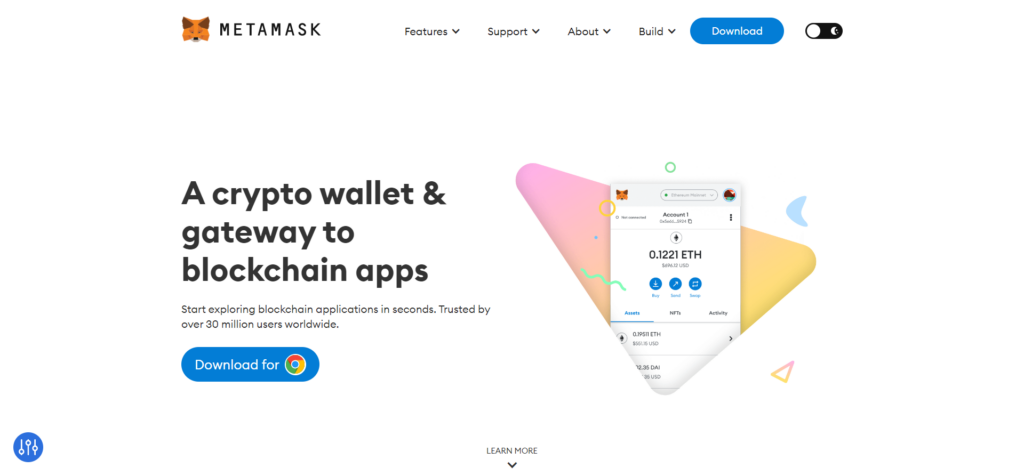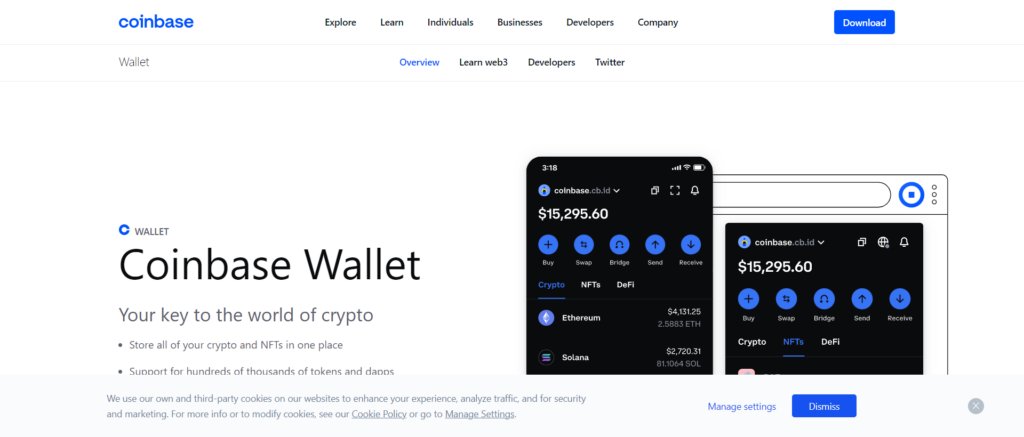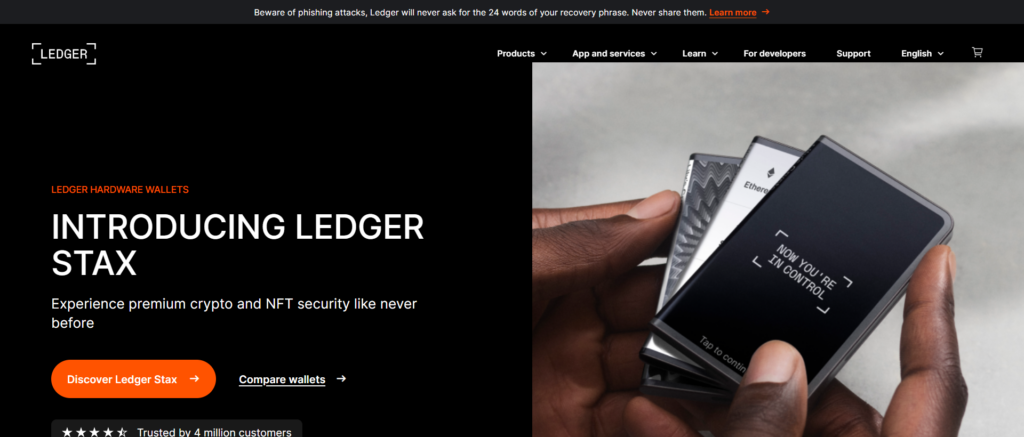7 Best Non-Custodial Crypto Wallets in 2023
Multiple factors go into choosing the best non-custodial crypto wallets, primarily their credibility, security, multi-currency support and easy user interface. These are the building blocks for not only non-custodial or self-custody wallets but all crypto wallets in general.
Based on these factors (and more), we have curated a list of the 7 best non-custodial crypto wallets. Whether you’re a beginner, high net worth investor or an occasional trader, this list has something for everyone.
But before we start, let’s do a quick recap of what non-custodial crypto wallets are and how they work.
What are Non-Custodial Crypto Wallets?
As opposed to custodial wallets, non-custodial wallets provide users complete control of their private key and, by extension, the responsibility to manage and keep it safe.
Most experts in crypto advocate for non-custodial crypto wallets for mainly two reasons –
a) Since you have complete control over your private keys, you also have full control over your crypto assets at all times.
b) They are relatively safer and less prone to hacks, though not immune to them.
Also, any transaction or activity on decentralized platforms or dApps requires a non-custodial wallet. Therefore, you must have a self-custodial crypto wallet to carry out DeFi activities like staking and lending crypto.
You can learn more about the differences between non-custodial and custodial wallets here.
1. MetaMask

MetaMask is, without a doubt, one of the best non-custodial crypto wallets. However, it does have its fair share of drawbacks.
Most notably, the fact that MetaMask doesn’t support Bitcoin. It mainly supports Ethereum-based tokens, including all ERC-20 tokens and NFT, along with some other blockchains, like Binance blockchain, Polygon, Avalanche, etc.
As for security, there seems to be no substantial criticism. The only threats users may face are from social engineering schemes. It’s when hackers pretend to be someone or something else to extract your seed phrase. After which, they can easily get access to your private key.
But that is a threat present in all non-custodial wallets. And it’s up to you to protect your crypto from phishing attacks and social engineering threats.
Other than this, MetaMask has an easy interface and setup process, which doesn’t require you to reveal your identity. One of its key features is multiple wallets within one app, meaning you can create and dedicate multiple wallets for different transactions.
Overall, MetaMask is an ideal choice for DeFi transactions and activities but not for beginners with less experience in crypto.
2. Trust Wallet

Trust Wallet is quite similar to MetaMask in terms of its features, except for a few things.
For instance, unlike MetaMask, Trust Wallet supports Bitcoin and over a million other cryptocurrencies. It also allows users to stake 12 of these cryptocurrencies right from their wallets.
Of course, much like any non-custodial wallet, you’re vulnerable to social engineering and phishing attacks. But they can be easily avoided if you don’t share your private key and seed phrase anywhere. Once you lose your private key or even forget it, there is no way to recover your wallet and the crypto assets in it.
The only downside in Trust Wallet’s security measures is its absence of multi-factor authentication, which has become an industry standard for most crypto wallets and exchange accounts. Other than that, Trust Wallet has an easy and convenient setup process and user interface.
3. Coinbase Wallet

Coinbase is one of the best non-custodial wallets for beginners. It has the perfect balance of features and benefits of a custodial exchange wallet with the security and anonymity of a non-custodial wallet.
Coinbase wallet supports most cryptocurrencies, including Bitcoin, Ethereum, and several Ethereum Layer-2 solutions, like Arbitrum and Optimism, Binance Smart Chain, Polygon, Ripple network, and NFTs.
And like most of the wallets listed here, this one also allows you to earn passive income on your crypto with staking. You can either download the mobile app or browser extension to use the wallet.
Coinbase, however, is notorious for its poor customer service. That is probably the only factor to look out for. Otherwise, Coinbase is a no-brainer for beginners.
4. Crypto.com DeFi Wallet

Crypto.com has many products, including its crypto exchange and mobile application. Usually, you get a custodial wallet with your exchange account on Crypto.com. But recently, Crypto.com launched a DeFi wallet separate from its exchange and mobile application.
What makes the Crypto.com DeFi wallet one of the best non-custodial crypto wallets is its unbeatable user interface, which is ideal for both beginners and veterans in crypto.
It supports all the major cryptocurrencies and tokens like Bitcoin, Ethereum, all ERC-20 tokens and much more. It also supports staking. As for security, it’s pretty standard. Everything you would expect from a non-custodial wallet, including two-factor authentication.
The only downside is the Crypto.com DeFi wallet is only available as a mobile application for Android and iOS.
5. Ambire

Ambire wallet is an odd one in this list of best non-custodial crypto wallets. In the sense that, unlike other self-custodial wallets, Amber doesn’t necessarily require you to write down seed phrases or private keys. Users can log in, complete transactions and recover their wallet using only their email.
While this may solve many inconveniences that people otherwise face in non-custodial wallets, it also exposes Ambire wallets to potential hacks and thefts.
Ambire has a multi-sig authentication process, meaning that it gives its users two private keys. One is encrypted by your email and password, while the other is safely stored in Ambire’s hardware security module. So, if a hacker only gets access to one of your private keys, they can’t steal your funds.
But security is not the only factor that makes Ambire stand out. Unlike other wallets, Ambire has built-in features, allowing users to buy, sell, swap and stake cryptocurrency within the wallet.
The only downside of Ambire would be its user interface, which according to some users, is a little clunky. Plus, it doesn’t have any mobile app extensions. But overall, Ambire is a one-of-a-kind non-custodial wallet that may intrigue more advanced users than beginners.
6. Exodus

Exodus sits at the same level as MetaMask and Trust Wallet in its popularity. And much like their popularity, most of their features and characteristics are also the same.
Exodus has the standard security procedure of seed phrases and private keys to protect your funds like any other non-custodial wallet. It supports over 150 cryptocurrencies, many of which are also available for staking. The user interface is decent. Not too good, not too bad.
Other than that, Exodus allows seamless integration with decentralized exchanges and dApps. Overall, Exodus is a reasonably good choice for someone with minimal needs in the DeFi sphere.
7. Ledger Nano Series

Crypto hardware wallets are considered to be the safest kinds of storage method for your cryptocurrencies. And the Ledger Nano Series is considered one of the best line of crypto hardware wallets out there. And obviously, they are non-custodial.
The reason why the Ledger Nano Series is at the bottom of the best non-custodial crypto wallets list is that not everyone may find hardware wallets convenient.
Nonetheless, the Ledger Nano series supports over 1500 cryptocurrencies, and some of its models also allow staking. The security measures are also top-notch. We have discussed the different Ledger Nano Series models in depth here.
The downside to using hardware wallets, the Ledger Nano series, in particular, is that they are quite expensive.
Final Thoughts
If you know what you want from a crypto wallet, it won’t be hard for you to choose the one from this list of 7 wallets. But if you don’t, ask yourself what your priority is.
Is it the security and safeguarding of your crypto assets? In that case, you should go with the Ledge Nano Series.
Is it convenience and an easy-to-use interface? Then go for Coinbase wallet.
Is it credibility and reliability? Go for MetaMask or Trust Wallet.
Or are you looking for more advanced features? Then Ambire may be a good choice for you.
No matter what your priority is, this list has something for everyone, as we promised in the beginning.